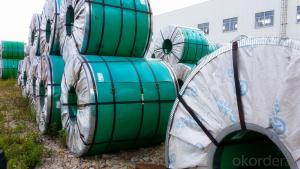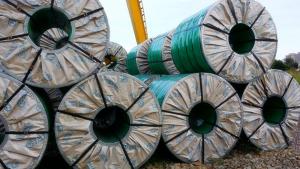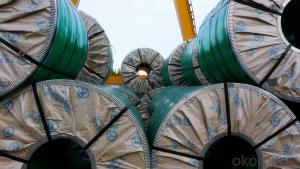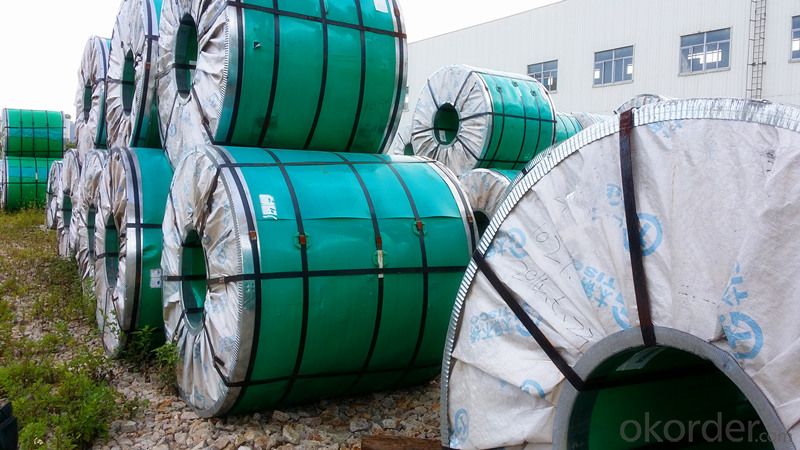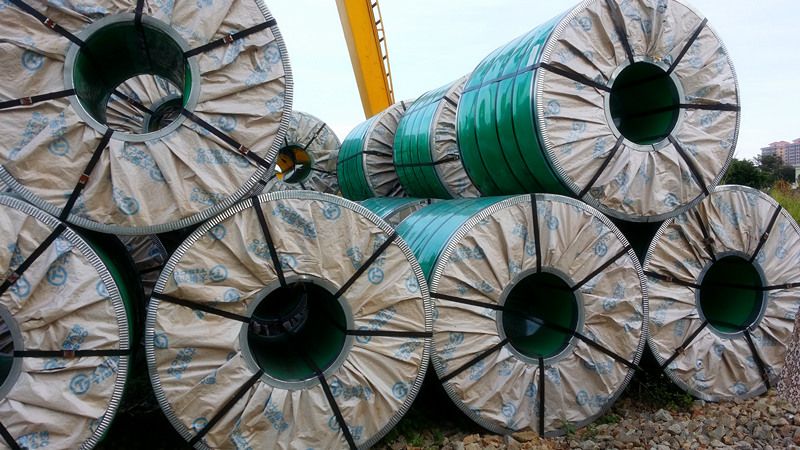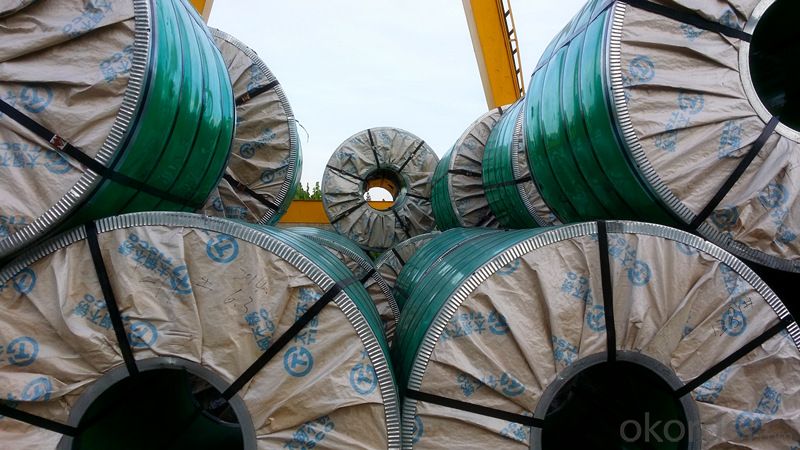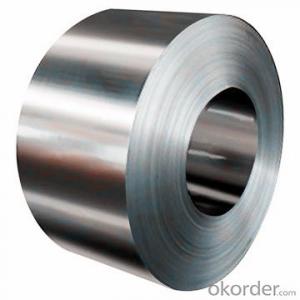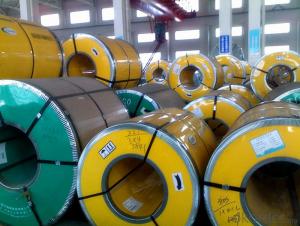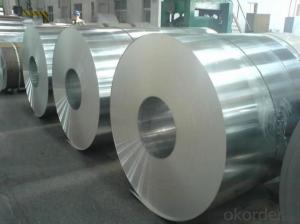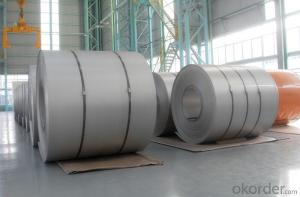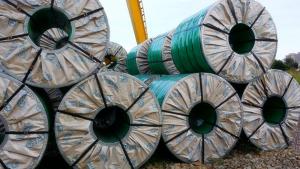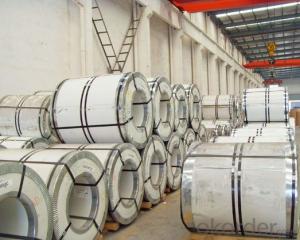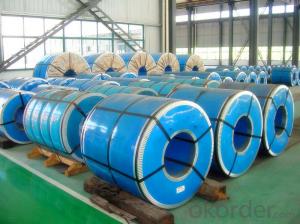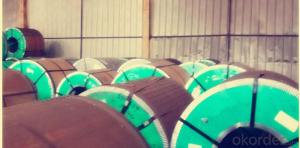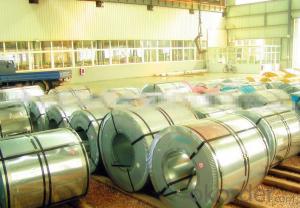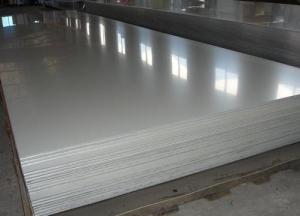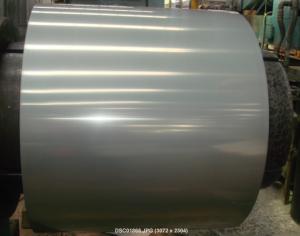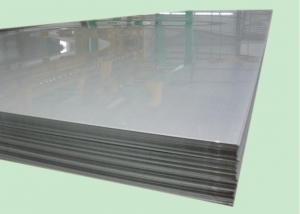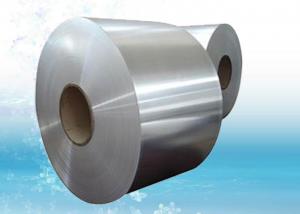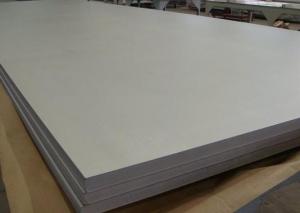Hot Rolled Stainless Steel Coil 430R No.1 Finish
- Loading Port:
- Guangzhou
- Payment Terms:
- TT OR LC
- Min Order Qty:
- -
- Supply Capability:
- 15000 m.t./month
OKorder Service Pledge
OKorder Financial Service
You Might Also Like
Grade: | 400 Series | Standard: | JIS,AISI,ASTM,GB,DIN,EN | Length: | Coil |
Thickness: | 2.5mm,3.0mm, 4.0mm | Width: | 1000mm, 1219mm, 1240mm, 1500mm | Place of Origin: | China Mainland |
Brand Name: | CNBM | Model Number: | 430R | Type: | Coil |
Application: | Element Supports,Stove trim rings,Fasteners,Chimney Liners | Certification: | ISO | Certificate: | ISO9001:2008 |
Surface: | No.1 | Technique: | Hot Rolled | Experience: | About 20 years |
Stock Information: | In stock | Weight per coil: | 18-22 tons | Tolerance: | +/-0.1mm or less |
Model No.: | 430R |
|
|
|
|
Hot Rolled Stainless Steel Coil 430R No.1 Finish
Article | Hot Rolled Stainless Steel Coil 430R |
Grade | 400 series |
Specification | 1m, 1.2m, 1.5m |
Surface | No.1 |
Type | Sheet / Coil |
Width | 1000mm, 1219mm, 1240mm, 1500mm |
Thickness | 2.5mm,3.0mm, 4.0mm |
Brand name | CNBM |
Parking | seaworthy wooden pallets or wooden cases,in 20' or 40' container or as per customers' requirements |
Payment | 30% in advance,70% after shipping, or L/C at sight |
Delivery Time | Stock materials, within7-15 days after received the deposit of T/T or L/C |
Hot Rolled Stainless Steel Coil 430R No.1 Finish
Grade | C | Cr | Si | Mn | Mo | Ni | P | S |
| Max |
| Max | Max |
| Max | Max | Max |
430R | 0.12 | 16.0-18.0 | 0.75 | 1.00 | ----- | 0.6 | 0.04 | 0.03 |
- Q: What is the electrical conductivity of stainless steel strips?
- The electrical conductivity of stainless steel strips can vary depending on the specific type and composition of stainless steel. Generally, stainless steel is not as conductive as other metals like copper or aluminum. The electrical conductivity of stainless steel is typically lower due to its higher resistance to the flow of electric current. However, there are stainless steel alloys that have been specifically designed for improved electrical conductivity. These alloys often contain higher levels of elements like nickel or copper, which enhance the material's conductivity. It is important to note that the electrical conductivity of stainless steel can also be affected by factors such as temperature, surface condition, and thickness of the strip. Therefore, it is advisable to refer to specific data or consult with manufacturers for accurate information on the electrical conductivity of stainless steel strips.
- Q: Can stainless steel strips be used in chemical processing plants?
- Yes, stainless steel strips can be used in chemical processing plants. Stainless steel is highly resistant to corrosion, making it suitable for handling various chemicals and corrosive substances in such environments. Its durability, strength, and hygienic properties make it an ideal choice for applications in chemical processing plants.
- Q: How do you prevent microbiologically influenced corrosion of stainless steel strips?
- Microbiologically influenced corrosion (MIC) poses a common problem across various industries, including the corrosion of stainless steel strips. To maintain the integrity of these strips and prevent MIC, it is possible to implement several preventive measures: 1. Opt for Resistant Stainless Steel: Select stainless steel grades that exhibit resistance to MIC, such as 316L or higher-grade alloys. These alloys contain higher levels of molybdenum, which enhances their ability to resist microbiological corrosion. 2. Ensure a Smooth Surface Finish: Guarantee that the stainless steel strips possess a polished and smooth surface finish. Rough surfaces provide crevices and pits that facilitate the thriving of microorganisms and the initiation of corrosion. Consistent cleaning and polishing help maintain surface smoothness. 3. Regular Cleaning and Maintenance: Consistently clean and sanitize the stainless steel strips to eliminate any biofilms or organic matter that may harbor microorganisms. Employ industry-approved cleaning agents and techniques to eradicate potential sources of microbial growth. 4. Employ Biocide Treatments: Apply suitable biocides or antimicrobial coatings to the stainless steel strips. These treatments can impede the growth of microorganisms and prevent corrosion initiation. However, it is crucial to choose biocides that are compatible with stainless steel to avert any adverse reactions. 5. Control the Environment: Maintain appropriate environmental conditions by regulating temperature, humidity, and the presence of corrosive chemicals. Microorganisms thrive in specific conditions, and by managing these factors, microbial growth can be minimized. 6. Implement Cathodic Protection: Introduce cathodic protection techniques, such as impressed current or sacrificial anode systems, to provide an additional layer of corrosion protection. These techniques aid in mitigating the effects of MIC on stainless steel strips. 7. Regularly Inspect and Monitor: Conduct regular inspections to identify any indications of corrosion or microbial growth on stainless steel strips. Establish a monitoring program that encompasses visual inspections, microbiological testing, and corrosion rate measurements to detect early signs of MIC and take appropriate measures. By implementing these preventive measures, the likelihood of microbiologically influenced corrosion on stainless steel strips can be significantly reduced, thereby ensuring their durability and performance.
- Q: How do you clean and maintain stainless steel strips?
- To clean and maintain stainless steel strips, start by wiping them with a soft cloth or sponge soaked in warm soapy water. Rinse them thoroughly and dry them with a clean towel to prevent water spots. For tougher stains or fingerprints, use a stainless steel cleaner or a mixture of vinegar and water. Avoid using abrasive cleaners or scrubbing pads as they can scratch the surface. Regularly wiping the strips with a microfiber cloth will help maintain their shine and prevent buildup of dirt or grease.
- Q: How do stainless steel strips handle thermal expansion and contraction?
- Stainless steel strips are known for their excellent thermal expansion and contraction handling capabilities. Due to the nature of stainless steel, which is a highly stable and resilient material, it can withstand extreme temperature changes without significant distortion or damage. When exposed to heat, stainless steel strips expand gradually and uniformly, allowing them to maintain their shape and structural integrity. This expansion is relatively low compared to other metals, which reduces the risk of warping or buckling. Similarly, when subjected to cold temperatures, stainless steel strips contract evenly, ensuring they can adapt to the changing conditions without compromising their strength. The exceptional thermal expansion and contraction properties of stainless steel strips make them suitable for various applications, particularly those involving temperature fluctuations. This includes industries such as construction, automotive, aerospace, and manufacturing, where the material is commonly used for structural components, fasteners, and heat exchangers. It is important to note that while stainless steel is highly resistant to thermal expansion and contraction, it is not entirely immune to the effects of extreme temperature changes. Proper engineering and design considerations should always be taken into account to ensure the material's performance is optimized and potential issues are minimized.
- Q: Are stainless steel strips suitable for elevator interiors?
- Yes, stainless steel strips are suitable for elevator interiors. Stainless steel is a durable and hygienic material that is resistant to corrosion, making it ideal for high-traffic areas like elevators. Additionally, stainless steel strips can also enhance the aesthetic appeal of the elevator interiors, providing a sleek and modern look.
- Q: Can stainless steel strips be used in architectural applications?
- Yes, stainless steel strips can be used in architectural applications. Stainless steel is a versatile material that offers a range of benefits suitable for architectural projects. It is known for its corrosion resistance, durability, and aesthetic appeal. Stainless steel strips can be used in various architectural elements such as cladding, roofing, handrails, decorative panels, and trim. They can be fabricated into different shapes and sizes to meet specific design requirements. Stainless steel strips also offer flexibility in terms of finishes, allowing architects to achieve different looks and textures. Overall, stainless steel strips are a popular choice in architectural applications due to their strength, longevity, and ability to withstand harsh environmental conditions.
- Q: What is the elongation of stainless steel strips?
- The elongation of stainless steel strips refers to the ability of the material to stretch or deform under tension before it breaks. It is a measure of the ductility or flexibility of the material. Elongation is typically expressed as a percentage, representing the increase in length of the stainless steel strip when subjected to a tensile load. The specific elongation of stainless steel strips can vary depending on factors such as the composition of the alloy, the manufacturing process, and the specific grade of stainless steel. Generally, stainless steel strips have a high elongation percentage, typically ranging from 40% to 60%. This high elongation makes stainless steel strips suitable for applications requiring flexibility and resistance to deformation, such as in the automotive, construction, and consumer goods industries.
- Q: Are stainless steel strips suitable for architectural mesh applications?
- Stainless steel strips prove to be an excellent fit for architectural mesh applications. Renowned for its durability and resistance against corrosion, stainless steel emerges as the optimal choice for outdoor or heavily trafficked areas. Its remarkable strength and stability, coupled with its flexibility in design and installation, make it an ideal selection. Moreover, stainless steel mesh not only ensures security and privacy but also permits airflow and visibility. With its alluring aesthetics and practicality, stainless steel strips become the ultimate option for architectural mesh applications.
- Q: Can stainless steel strips be used in architectural façade systems?
- Yes, stainless steel strips can be used in architectural façade systems. Stainless steel is a popular choice for architectural applications due to its durability, corrosion resistance, and aesthetic appeal. It can be used as cladding or decorative elements in façade systems, providing a sleek and modern appearance to buildings.
Send your message to us
Hot Rolled Stainless Steel Coil 430R No.1 Finish
- Loading Port:
- Guangzhou
- Payment Terms:
- TT OR LC
- Min Order Qty:
- -
- Supply Capability:
- 15000 m.t./month
OKorder Service Pledge
OKorder Financial Service
Similar products
Hot products
Hot Searches
Related keywords
